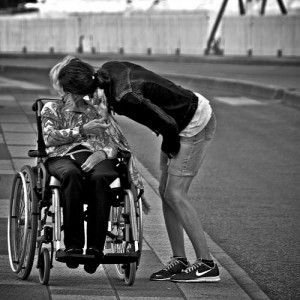
In an ageing population people are living longer but often with poorer health, multiple long-term conditions or age-related and/or existing disabilities. Both health and social care services have important roles to play in ensuring older people can still enjoy a good quality of life, even if they are disabled and/or have long-term conditions.
However, current funding crises within health and social care mean that older people with multiple long-term conditions may not be getting the social care and support they need to maintain a good quality of life in the community or in residential care settings; to prevent unnecessary hospitalisation and to enable discharge from hospital and reablement in their own homes and communities.
In this context it’s especially important to understand the evidence on what works, so people get the best support and that the support is of best value all-round. This blog briefly explores the new NICE Guideline NG122 on person-centred, integrated social care support for older people with multiple long-term conditions (including physical or mental conditions), which aims to provide the type of evidence-based guidance needed.

The NICE Guideline is about person-centred, integrated social care support for older people with multiple long-term conditions.
Methods
The Guideline team conducted a scoping exercise and a formal systematic review of the research literature, including economic evaluations. After expert consultation with the Guideline Development Group, the team searched the relevant databases and online sources for documents from 2004 onwards. Of the 20,370 records that got to screening stage, 40 articles were finally included for data extraction and critical appraisal. The research geeks among you will be pleased to see that all the associated methodological documents are available on the NICE website to download.
As well as the formal research, the evidence-base encompassed expert testimony and specific consultation with older people with lived experience of multiple long-term conditions and social care support use. The Guideline was developed on broader consultation with wider stakeholders. The separate documents summarising evidence from professional and experiential experts are available online too.
Finally, an Equality Impact Assessment of the Guideline was undertaken and the results are reported.

NICE recommend having one named care co-ordinator liaising with health, social care and other support providers and making referrals.
Findings and recommendations
The guidelines identify the following seven factors as being fundamental for the development and delivery of effective person-centred social care and support for older people with multiple long-term conditions:
1. Identifying and assessing social care needs
- referral to a specialist clinical assessment if needed
- involve the individual and focus on their strengths, preferences, whole life and personhood,
- identify carers
- provide information on available services and support including costs and how they can be paid for
- discuss options for telecare, if relevant
2. Care planning, including the role of the named care co-ordinator
- coordinated with individuals, carers and health and social care practitioners with one named care co-ordinator leading and liaising with health, social care and other support providers and making referrals
- reviewed at least annually or in response to changes
- collaboration with individuals to include all aspects of their life and activity, social and emotional needs as well as mental and physical health, palliative and end of life care
- collaboration with carers, where appropriate
- offer personal budgets and direct payments as options, with the necessary support and advice
3. Supporting carers
- carers must have their own assessment, taking into account the individual’s care plan
- offer personal budget as an option, with the necessary support and advice on how to spend them
4. Integrating health and social care planning
- the named care co-ordinator liaises and refers across health and social care
- ensure there is multi-disciplinary, community-based care and support for older people with multiple long-term conditions
5. Delivering care
- provide information and support on all aspects of care and support including options for community involvement, peer support and advocacy services
- support for self-management
- ensure continuity of care and links with specialist services
- care in care homes, including community inclusion and information about cost and quality to enable informed decision making
6. Preventing social isolation
- all practitioners and services to play a role in reducing social isolation and improving social activity and community engagement
7. Training health and social care practitioners
- staff should have necessary training and competencies in handling medicines
- staff should recognise and be able to address disability support and nutritional needs, mental and physical health deterioration and social and emotional aspects of the older person’s life (such as bereavement)
The guidance also maps out areas for further research to support better social care and support for older people with multiple long-term conditions:
- Older people’s experiences
- Service delivery models
- Supporting people in care homes to stay active
- Developing a ‘risk positive’ approach in care homes
- Self‑management

Care planning should include all aspects of life and activity, social and emotional needs as well as mental and physical health, palliative and end of life care.
Conclusion
Overall the Guideline has a very comprehensive and inclusive evidence-base, as it draws on a robust systematic review of the research as well as other types of social care knowledge, including practitioner, organisational and service user and carer.
The Guideline sets out best practice, based on the best available multiple evidence sources. However, the current conditions for implementing the recommendations in social care and health are not the best and there is a note of realism in the section on ‘getting started’. When considering how to use the Guideline recommendations to improve social care support for older people with multiple long-term conditions, stakeholders are reminded of the broader social care contextual challenges:
- empowering older people with social care needs and multiple long‑term conditions and their carers to choose and manage their own support
- empowering practitioners to deliver person‑centred care
- integrating different care and support options to enable person‑centred care

It’s about empowering older people and carers to choose and manage their own support and empowering practitioners to deliver person‑centred care.
Link
NICE (November 2015) NG22: Older people with social care needs and multiple long-term conditions [Full resource]
Photo Credits
Swansea Photographer via Compfight
Oiluj Samall Zeid via Compfight
joshjanssen via Compfight

Useful summary from @SocialCareElf of guidelines. @bethyb1886 @Ann_Macfarlane @KarinOrmanOT @indepliving https://t.co/xwu05le0x0
Many thanks for sharing this @bernardawalker Excellent from @SocialCareElf! @Ann_Macfarlane @KarinOrmanOT @indepliving
RT @SocialCareElf: New NICE Guideline on social care support for older people with multiple long-term conditions https://t.co/vqqWrjGFzV
New NICE Guideline on social care support for older people with multiple long-term conditions https://t.co/UxuhG0Tqa0 via @sharethis
RT mgoat73: New NICE Guideline on social care support for older people with multiple long-term conditions https://t.co/wnKjfsq3gl via shar…
Explore the NICE Guidelines & what works for #socialcare for older people with multiple long-term conditions https://t.co/a3dmdJNMEE
New NICE Guideline on social care support for older people with multiple long-term conditions https://t.co/bj26lFVklw via @SocialCareElf
Person-centred, integrated support for older people with multiple long-term conditions #LTC: What does #NICE say? https://t.co/Iq7VHDYJKE
RT @SocialCareElf: @SchrebersSister takes a look at the new @NICEcomms Guideline on #socialcare for #olderpeople with #LTC https://t.co/axo…
RT @SocialCareElf: Don’t miss: New NICE Guideline on social care support for older people with multiple long-term conditions https://t.co/c…